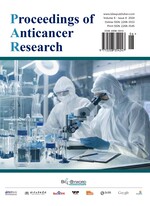Abstract
Objective: To explore the changes in the expression of autophagy-related protein BECN1 and tumor-associated macrophage marker CD68 in colorectal cancer and investigate their association with clinicopathological features and prognosis in colorectal cancer patients. Methods: Sixty colorectal cancer patients were selected as study subjects. Immunohistochemistry was used to detect the expression of BECN1 and CD68 in both colorectal cancer tissues and adjacent non-cancerous tissues. Based on immunohistochemistry results, patients were divided into a BECN1 high-expression group (33 cases) and low-expression group (27 cases) and a CD68 high-expression group (33 cases) and low-expression group (27 cases). Survival rates and survival times of the two groups were compared using the Kaplan-Meier survival curve and Log-Rank test. The correlation between BECN1 and CD68 expression in colorectal cancer tissues was analyzed. RT-qPCR was employed to examine changes in macrophage-associated markers after BECN1 interference. Results: Expression levels of BECN1 and CD68 in colorectal cancer tissues were significantly higher than those in adjacent tissues and were positively correlated with the TNM stage. Survival analysis showed that patients in the BECN1 and CD68 high-expression groups had shorter overall survival compared to those in the low-expression group (P < 0.05). BECN1 and CD68 levels in colorectal cancer patients were positively correlated (P < 0.001). BECN1 interference markedly reduced the expression of macrophage markers and decreased M2 polarization. Conclusion: Abnormal expression of BECN1 and CD68 in colorectal cancer patients is associated with TNM stage and poor prognosis, suggesting that BECN1 and CD68 can serve as important indicators for postoperative prognostic evaluation.
References
Siegel RL, Giaquinto AN, Jemal A, 2024, Cancer Statistics, 2024. CA Cancer J Clin, 74(1): 12–49. https://doi.org/10.3322/caac.21820. Erratum in CA Cancer J Clin, 74(2): 203. https://doi.org/10.3322/caac.21830
Wang Z, Dan W, Zhang N, et al., 2023, Colorectal Cancer and Gut Microbiota Studies in China. Gut Microbes, 15(1): 2236364. https://doi.org/10.1080/19490976.2023.2236364
Debnath J, Gammoh N, Ryan KM, 2023, Autophagy and Autophagy-Related Pathways in Cancer. Nat Rev Mol Cell Biol, 24(8): 560–575. https://doi.org/10.1038/s41580-023-00585-z
Maheshwari C, Vidoni C, Titone R, et al., 2022, Isolation, Characterization, and Autophagy Function of BECN1-Splicing Isoforms in Cancer Cells. Biomolecules, 12(8): 1069. https://doi.org/10.3390/biom12081069
Kuo WT, Chang JM, Chen CC, et al., 2022, Autophagy Drives Plasticity and Functional Polarization of Tumor-Associated Macrophages. IUBMB Life, 74(2): 157–169. https://doi.org/10.1002/iub.2543
Larionova I, Tuguzbaeva G, Ponomaryova A, et al., 2020, Tumor-Associated Macrophages in Human Breast, Colorectal, Lung, Ovarian and Prostate Cancers. Front Oncol, 10: 566511. https://doi.org/10.3389/fonc.2020.566511
Ma Y, Zhan S, Lu H, et al., 2020, B7-H3 Regulates KIF15-Activated ERK1/2 Pathway and Contributes to Radioresistance in Colorectal Cancer. Cell Death Dis, 11(10): 824. https://doi.org/10.1038/s41419-020-03041-4
An Z, Chiang WC, Fernández ÁF, et al., 2022, Beth Levine’s Legacy: From the Discovery of BECN1 to Therapies. A Mentees’ Perspective. Front Cell Dev Biol, 10: 891332. https://doi.org/10.3389/fcell.2022.891332
Salwa A, Ferraresi A, Chinthakindi M, et al., 2021, BECN1 and BRCA1 Deficiency Sensitizes Ovarian Cancer to Platinum Therapy and Confers Better Prognosis. Biomedicines, 9(2): 207. https://doi.org/10.3390/biomedicines9020207
Cervantes-Díaz MT, Muñoz-Granados AJ, Olguín-Cruces VA, et al., 2022, BECN1 Protein Expression is Associated with Poor Survival in Triple Negative Locally Advanced Breast Cancer. Eur Rev Med Pharmacol Sci, 26(2): 354–366. https://doi.org/10.26355/eurrev_202201_27860
Li X, Yang KB, Chen W, et al., 2021, CUL3 (Cullin 3)-Mediated Ubiquitination and Degradation of BECN1 (Beclin 1) Inhibit Autophagy and Promote Tumor Progression. Autophagy, 17(12): 4323–4340. https://doi.org/10.1080/15548627.2021.1912270
Hu F, Li G, Huang C, et al., 2020, The Autophagy-Independent Role of BECN1 in Colorectal Cancer Metastasis Through Regulating STAT3 Signaling Pathway Activation. Cell Death Dis, 11: 304. https://doi.org/10.1038/s41419-020-2467-3
Qureshi-Baig K, Kuhn D, Viry E, et al., 2020, Hypoxia-Induced Autophagy Drives Colorectal Cancer Initiation and Progression by Activating the PRKC/PKC-EZR (Ezrin) Pathway. Autophagy, 16(8): 1436–1452. https://doi.org/10.1080/15548627.2019.1687213
Hu F, Song D, Yan Y, et al., 2021, IL-6 Regulates Autophagy and Chemotherapy Resistance by Promoting BECN1 Phosphorylation. Nat Commun, 12: 3651. https://doi.org/10.1038/s41467-021-23923-1
Nasir I, McGuinness C, Poh AR, et al., 2023, Tumor Macrophage Functional Heterogeneity Can Inform the Development of Novel Cancer Therapies. Trends Immunol, 44(12): 971–985. https://doi.org/10.1016/j.it.2023.10.007
Zhang W, Song ZJ, Zhang BY, et al., 2021, Multiplex Immunohistochemistry Indicates Biomarkers in Colorectal Cancer. Neoplasma, 68(6): 1272–1282. https://doi.org/10.4149/neo_2021_210312N324
Väyrynen JP, Haruki K, Lau MC, et al., 2021, The Prognostic Role of Macrophage Polarization in the Colorectal Cancer Microenvironment. Cancer Immunol Res, 9(1): 8–19. https://doi.org/10.1158/2326-6066.CIR-20-0527
Shin HC, Seo I, Jeong H, et al., 2021, Prognostic Impact of Tumor-Associated Macrophages on Long-Term Oncologic Outcomes in Colorectal Cancer. Life (Basel), 11(11): 1240. https://doi.org/10.3390/life11111240
Jin X, You L, Qiao J, et al., 2024, Autophagy in Colitis-Associated Colon Cancer: Exploring Its Potential Role in Reducing Initiation and Preventing IBD-Related CAC Development. Autophagy, 20(2): 242–258. https://doi.org/10.1080/15548627.2023.2259214
Zhang K, Guo J, Yan W, et al., 2023, Macrophage Polarization in Inflammatory Bowel Disease. Cell Commun Signal, 21(1): 367. https://doi.org/10.1186/s12964-023-01386-9
